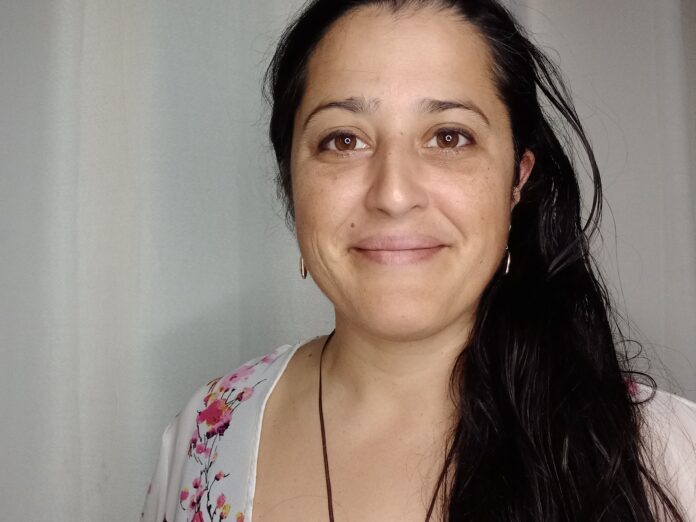When I interview her, Zoë has just returned from a 4- and a half-week intensive retreat abroad, on awakening to jealousy, pride, anger, aversion, ignorance, sleep, nutrition, among other things! I can’t imagine the energy required to record and master so many elements, but I soon realize that Zoë has determination in spades!
She enthusiastically answers my questions.
What was your degree course in sexology?
I studied and did my supervisions with Dr. Patti Britton (one of the American pioneers in sexology) and her team, at Santa Clara University in California. I graduated in June 2020, after a very comprehensive three-year course that included sexology, of course, but also coaching, communication, workshop management and so on. I’m currently studying for a doctorate in clinical sexology at the International Institute of Sexology in Florida, and I’m in the 1e semester of a long journey and hope to finish in three years!
What is clinical sexology?
It’s there to help an individual move forward in the face of a sexual well-being issue. So it’s a personalized approach, cognitive education redirected to scientific facts, reframing of learned knowledge, coactive support, sharing of resources… and referrals to other specialists and colleagues. When I don’t know what to do, or I know I’m not the right person to help, I redirect the patient.
Are you still the only sexologist in Mauritius?
I’m sure not, but I’m making myself visible! So, for the time being, I’d like to say yes, even if I think some of the students will be graduating soon. In Mauritius, there are also sex educators through the diocese, in schools… I would have so much liked a meeting with all these players, to legitimize this field and make it clear to everyone, because it seems to me that there are charlatans! But I don’t want to be the one to organize it. A neutral agent would be interesting… so it’s something to think about!
Is your patient base growing? Are most of them couples, or do men and women come individually?
Yes, it’s growing, and there’s a balance between the two patient groups. Generally, for couples, one of the partners comes to see me alone, asking me questions thinking he can help his couple without his partner knowing he’s talking to me. That’s when I encourage them to move forward together.
What is sexual well-being? How is it linked to physical and mental well-being?
Emotions! The feeling of emotions and the ability to feel without fleeing! To be able to give and receive without fleeing. To be able to ask without shame or embarrassment. To not be intimidated by someone who is in control. Our sexual well-being is determined by the way we’ve been taught about pleasure and sex. Our sexual activity must be part of a sharing dynamic. I mean in a way that makes us comfortable in sexual expression with ourselves and in sharing with another or others.
You say that “the majority of Mauritians, following social rules and the unspoken, don’t know each other sexually… and are in misery”. Could you elaborate?
My point is that we’re dealing with the objectification of bodies. It’s about how we’re taught to compete, how we’re conditioned to understand gender roles. There is no sex education based on emotions. Here, we talk about pregnancy, contraception and sexually transmitted diseases and infections. Nothing about pleasure, nothing about relationships! 90% of those who come to see me have received no education whatsoever. So they’re lost, they don’t understand and they do what others do… but others are just as lost! A child who depends on his parents, on those who take care of him and represent his example, will be like them and take on their habits! This will then be felt in the area of intimacy, tenderness, affection… or the way we say hello, goodbye, or treat each other!
How can we help people understand that “practicing” is not the same as “being satisfied”, and that orgasm is not the end of a sexual act?
It’s not the same approach for everyone. Each person’s journey to sexual peace and desire is different. Their background, culture, upbringing, family environment… tell me how to help each individual take pleasure beyond stress relief. When orgasm is associated with relaxation and appeasement, it’s clear that we’re running towards it, rather than staying in the moment with ourselves or with the other person.
“The sexual well-being worksite in Mauritius is still full of crevices!”
Do you think that institutions (medical, educational, etc.) can take action and implement solutions independently of consultations with sexologists?
The sexologist isn’t just a consultant! He can help build programs, he can train teachers… Yes, that would be a great idea! Writing articles in serious magazines could also be useful! As I’m doing with you, by the way, because your questions are powerful! But it’s also important that the leaders in the Ministry of Education see the value in it and give permission. It’s an uphill battle that can’t be done alone!
The criminal code of Mauritius considers sex – and everything connected with it – to be obscene. Otherwise, I’d be prescribing sex prostheses to those who need them! The legal authorities haven’t even clearly defined what obscenity is, and anal penetration is still illegal! The Collectif Arc-en-Ciel (CAEC) is doing its best to change this status, and I hope we’ll soon be having this conversation in parliament! What’s more, there are no psychiatrists here to monitor paedophiles and children who have been abused.
Sexual well-being in Mauritius is still full of cracks!
Article 86 of the Mauritian Criminal Code :
https://attorneygeneral.govmu.org/Documents/Laws%20of%20Mauritius/AZ%20Acts/C/Cr/CRIMINAL%20CODE%20(SUPPLEMENTARY)%20ACT,%20Cap%20196.pdf
Was sex education part of your initial training in sexology or did it become part of your practice because of the need for information in Mauritian society?
I have customers in America and Europe, so I’m not just here for Mauritians. My sex education was done by the biology teacher at Lycée Labourdonnais, so I’m not a local example. But then again, there wasn’t much about pleasure. We heard: “Be careful, it can be dirty! Be careful, being a parent at a young age is strongly discouraged!” The message doesn’t promote well-being! It’s all about abstinence, disgust and fear!
The concept was more present in my sexology training. It included notions of anatomy and neurology, coaching for the individual and the couple, a process of analysis and implementation of a program that supports everyone’s wishes, and intense supervision sessions.
Can your consultations be likened to therapy?
Given the definition of the term (medical treatment in general, and psychotherapy in particular), no!
I work with doctors on physiological issues. If the person is stuck in “why my life, why me”, I refer them to a psychologist or psychotherapist. The clinical sexologist diagnoses the person’s general well-being and stays focused on “how can we move towards well-being right now, through concrete actions?” These activities unravel “the why” in every way. I don’t prescribe any drugs, and we’ve been shown that this should never be the first resort.
Do you think, then, that the emotional stress and blockages inherent in couples’ sexuality can also be dealt with by other practitioners (gynecologists, psychologists, etc.)?
Unless the practitioner has training in sexology or clinical sexology, no! We’re complementary, but we don’t all have the same listening and implementation skills.
Have you had any brides and grooms come to you for advice or information about their wedding night?
Uh… virginity before marriage is rare in Mauritius! The Durex company carried out a local study which showed that sexual activity starts very young here. On the other hand, I’ve had couples of all sexual orientations ask me to help them blossom, to keep their hearts open, their communication open, their bodies open to each other… throughout their marriage. It’s important to remember that everything changes all the time. So, beyond the wedding night, it’s more about approaches to staying happy together and in the journey towards death.
You say that the sexual act is not only an act of love, but a “vital sensation” to be enjoyed absolutely! How do you get this message across to Mauritians?
It’s not easy! Ha ha ha… To enjoy is to take pleasure, it’s not just about orgasm! And when I say enjoyment, I also mean being amazed by all that life has to offer! I pass on my message in small groups, online, live and in one to one. Every drop counts!
“Stay tuned, don’t doubt!”
A message for couples who read La Gazette Mag, whose theme this month is marriage?
Keeping our hearts open to each other isn’t always easy, but with the will to end our lives with each other (dying together), a way can always be found.
Look at yourself in the mirror and take stock of the emotional insecurities you have today, which are preventing you from feeling and sharing your body with pleasure, and from speaking without embarrassment. Yes, sometimes we have a partner who is far from being able to hear, and who reacts with anger, denial or with detour of words that put doubt in the mind. But keep listening, don’t doubt!
The couple is not the union of two universes, it’s three entities! The universe of one, the universe of the other and the universe built by the two of them. The latter is not necessarily linked to one of the first two entities. It’s the space that makes you want to die together. Getting married isn’t about living together, it’s about choosing to go down the road together, towards death! This life, this death… there’s no way to put them on pause or to relive and correct the past. So, bite into life and know that, once it’s accepted in dialogue, fear only lasts for a moment!





